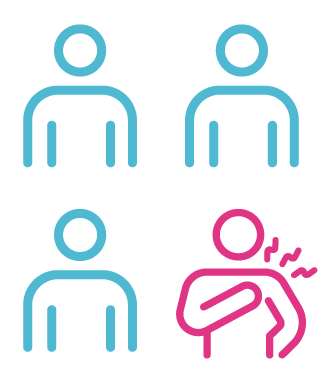Are you guilty of these mistakes? How to improve MSK health in the workplace, post-pandemic.
It is no secret that the coronavirus pandemic has had plenty of undesirable effects on organisations, globally. One of which is the rise of musculoskeletal (MSK) condition.
Defined, ‘MSK conditions’ refers to a broad range of issues which effect the joints, bones, and muscles in our bodies. They are often persistent and painful issues which greatly reduces mobility.
There is a great deal of triggers that can cause someone to suffer with their MSK health in the workplace, most of which can be avoided. Are you doing all you can to ensure you employees aren’t made victim to these conditions?
In 2021 it was discovered that:

Almost one in four (24%) employees have experienced Musculoskeletal conditions in the workplace, with these disorders accounting for 28% of all work-related ill health cases.

Only 59.4% of people of working age with a MSK condition are in work, and around 1 in 5 people with arthritis has depression.
What’s more, of the 470,000 workers suffering from work-related MSK disorders in 2020/21, an estimated 85,000 said that this was caused or made worse by the effects of the coronavirus pandemic.
|
Pre-Pandemic |
Post-Pandemic |
|
In 2018/19, the percentage of people in the UK ages 18 and over reporting a MSK condition was 16%.
|
In 2021, this figure has doubled. 32% of the population have an MSK condition in the UK, around 23.3 million people.
|
|
In 2016, 24% reporting a long term MSK problem who also report depression or anxiety |
In 2021, 40% of people with multimorbidity are living with a physical and a mental health condition. |
Why should you care about putting together an ergonomics plan to improve MSK health?
There is a clear business case for employers to prevent MSK issues. Not only there a legal obligation to do so but, if good quality work is what you desire, their wellbeing must be at the forefront.
The Work Foundation discovered that it costs the UK around £7.4 billion a year when employees to miss work due to MSK conditions. And, what’s worse, there is a clear link between mental health problems and those diagnosed. So, not is your business at risk of taking a monetary hit due to these conditions but, more likely than not, productivity and the quality of work will be impacted too
What are the most common mistakes businesses make when it comes to MSK health?
- Lack of education around safe working practices
Providing adequate training and assessments is not only a legality but it is essential for teaching employees how to do their job safely. An e-learning platform is a great way to achieve company-wide compliance, easily.
- Not taking preventative measures to avoid repetitive strain syndrome
Manual Handling, for instance, can be risky at the best of times. Even more so when you fail to rotate your workers, so that your employee isn’t performing the same repetitive and strenuous actions daily. Be vigilant when assigning tasks to those who may be more vulnerable in developing an MSK condition.
- Not considering how mental health is affected when an employee is struggling with a condition
The correlation between on-going physical pain and mental health issues is evident. Putting your employee on the right path to recovery and providing regular catchups to see how they are coping is bound to have a positive effect on their work ethic. As the saying goes, a problem shared is a problem halved.
- Not providing employees with the correct equipment when working from home
Having a suitable DSE Workstation is vital, regardless on location. By conducting DSE Assessments for home-workers you can see where the problems lie and take corrective actions to ensure your employees are safe.
- Not signposting around the office for MSK support
Partnering with charities or using resources provided by your local health providers is a great way to spread accurate information amongst your work force. Instead of letting your staff suffer in silence, make it easier for them to reach out and get support.
Learn more about your legal obligations as an employer and download your free MSK and DSE Guide today.
Tags:
